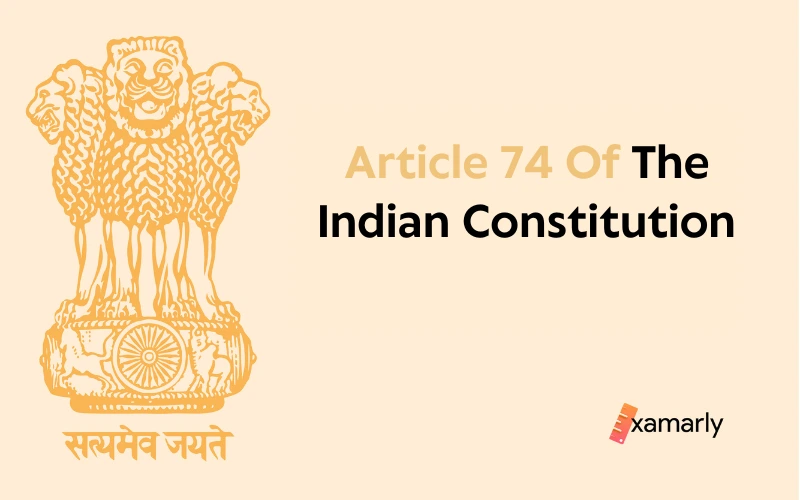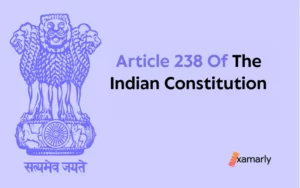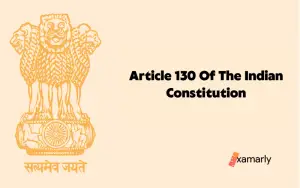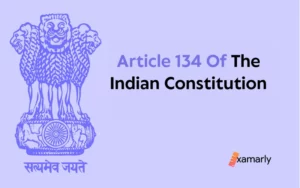India is a democratic nation that adheres to secularism. The Prime Minister along with the Council of Ministers make up the parliamentary form of government.
A Council of Ministers should exist, according to Article 74 of the Indian Constitution, with the Prime Minister serving as its head.
The Council supports the President in carrying out his duties effectively. The Council’s recommendations are not subject to review by the judiciary.
State ministers, deputy ministers, and cabinet ministers make up the Council.
The President must consult the Council of Ministers for advice in accordance with the Constitution’s 42nd and 44th Amendments.
The UPSC syllabus of Indian Polity and Governances contains Article 74 and is described on this page.
- History of the Council of Ministers' Union Executive
- Article 74 Of The Indian Constitution: Constitutional Provisions
- Amendments Made To Article 74
- Strength Of The Ministerial Council
- Important Case: S. R. Bommai v. Union of India (1994)
- Article 163 (3) Similar To Article 74 (2)
- Categories Of Council Of Ministers
- Conclusion
- FAQs On Article 74
History of the Council of Ministers’ Union Executive
The Indian Constitution has adopted the British parliamentary system of government, in which the Council of Ministers, which is presided over by the Prime Minister, serves as the actual executive of the Indian Union and actually executes the President’s theoretically granted executive authority.
In the Indian Councils Act of1861, Lord Canning initiated it.
Article 74 Of The Indian Constitution: Constitutional Provisions
- There will be a Council of Ministers led by the Prime Minister to assist and advise the President, who will act in accordance with their recommendations while carrying out his duties:
With the caveat that the President may ask the Council of Ministers to reevaluate such advice, generally or otherwise, and that the President must follow the advice provided upon such reevaluation. - No court shall inquire if any, and if so, what kind of advice, was provided to the President by Ministers.
Amendments Made To Article 74
The law is dynamic and constantly evolving to meet societal demands. 1950 saw the implementation of the Indian Constitution.
Certain adjustments to the laws are necessary for both the well-being of the populace and the efficient operation of the government.
The terms of any revisions to the Indian Constitution are outlined in Article 368.
The 42nd and 44th Amendments to the Constitution, which both have a significant impact on Article 74, are discussed below:
By 42nd Amendment
Prior to the 42nd amendment, Article 74(1) specified that the Prime Minister would serve as the head of the Council of Ministers, which would assist and advise the President as he carried out his duties.
There was some doubt, though, as to whether the President must abide by the Council of Ministers’ recommendations.
The President must act in line with such recommendations, according to the 42nd Amendment (1976), which made this clear. On January 3, 1977, the amendment became operative.
For a list of the amendments to the Constitution’s provisions made in the wake of the 42nd amendment of the Indian Constitution, see the linked article.
By 44th Amendment
However, the President may return the recommendation for further consideration only once, according to the 44th Amendment (1978).
However, the President must accept it if the Council of Ministers delivers the same recommendation to him again. On June 20, 1979, the amendment became operative.
Visit the linked article to get a list of the modifications made to the Constitution’s clauses following the 44th amendment of the Constitution.
Strength Of The Ministerial Council
The Constitution makes no indication of its size or classification.
The Prime Minister sets its dimensions based on the demands of the moment and the circumstances.
It should not, however, exceed 15% of the overall strength of the House of People, according to the 91st Constitutional Amendment Act of 2003.
Important Case: S. R. Bommai v. Union of India (1994)
In this case, the Supreme Court made some crucial rulings about the application and impact of Clause (2) of Article 74. Courts are prohibited from looking into the counsel provided to the President by the Council of Ministers under Article 74(2).
In a sense, this article prevented the Supreme Court’s judicial review authority from applying to the Council of Ministers’ advice. Regarding this, the Supreme Court ruled that while Article 74(2) prohibits judicial review of the Minister’s advice, it does not prevent the court from looking over the information on which the advice is based.
It also stated that the information used to form the foundation of the advice was not included in the advice itself and that courts were justified in examining the information used to form the basis of the advice to see whether it was pertinent and whether the President could have taken action based on it.
The restriction in Article 74(2) does not invalidate their right to know about the actual presence of any such material, the court added in a statement regarding its investigation into the existence of such material.
By making the President’s order indisputable on the grounds that it was either against the advice offered by the ministers or was issued without receiving any advice from them, the court further demonstrated that Article 74(2) grants the President freedom.
Article 74(2)’s sole purpose was to render the question of whether the President had acted in accordance with the Ministers’ advice or in contravention of it, non-justiciable.
The sole option available to the union cabinet when it comes to the President’s unconstitutional actions is impeachment by the Parliament because, in accordance with Articles 74(2) and 361, court action is not permitted.
The impeachment action by parliament is valid only if the charges of the president breaching the constitution are proven by a court or tribunal selected by either house of Parliament with a two-thirds majority of its total membership, according to Article 61 of the Constitution.
As long as the president has not broken the law, that is, has not followed the ministers’ unlawful advice even after being sent back for reconsideration, he need not resign or may request the Supreme Court to have his position restored.
Article 163 (3) Similar To Article 74 (2)
In a manner identical to that of clause 2 of Article 74, Article 163(3) applies to the governors of those states.
The Governor may take action at his discretion without going against the Constitution when cabinet members or meeting minutes do not support the advice offered to him.
Categories Of Council Of Ministers
The following three categories of ministers (i.e. Council of Ministers) are essentially described below:
- Cabinet ministers: All of the key government ministries, including the departments of defense, finance, external affairs, and home affairs, are headed by cabinet ministers. It is crucial to the creation and implementation of policies.
- Ministers of state: These ministers serve as appointees to the cabinet and are not given any authority to govern their own ministries.
- Deputy minister: The cabinet minister and the ministers of state are above the deputy ministers. They are unable to independently lead any ministries while assisting the cabinet and ministers of state.
Conclusion
A Council of Ministers is established by Article 74 of the Constitution of the Republic of India to assist the President in carrying out his or her duties.
If power is delegated to one person, a dictatorship will emerge. In the democratic and republican nations of India, the various authorities have a fair amount of power.
The cabinet system was adapted into the Indian Constitution from the British Constitution (the British Constitution is not written down).
The monarch following the Ministers’ recommendations is usually accepted in Britain.
The President is therefore the official head of India, but he is required to abide by the Council of Ministers’ recommendations.
Article 73 is a part of the Indian Polity and Governance of UPSC Syllabus and is important from the exam perspective. So read this article as well as other linked articles from the table given below to boost your Indian Polity Preparation for competitive exams like IAS.
FAQs On Article 74
What Is The Difference Between The Council Of Ministers And The Cabinet?
The cabinet is made up of all the ministers of significant and large ministries, whereas the Council of Ministers is made up of state ministers, cabinet ministers, and deputy ministers. The cabinet has 15-20 members, compared to the 70–80 members of the Council of Ministers. Decisions made by the Cabinet must be carried out by the Council of Ministers.
What Is The Meaning Of Article 74?
According to Article 74 of the Constitution, there shall be a Council of Ministers, headed by the Prime Minister, to assist and advise the President, who shall follow their recommendations when performing his duties.
Which Amendments Have Amended Article 74?
42nd amendment and 44th amendment have made some slight changes to Article 74.
Is The Council Of Ministers A Real Executive?
Because the President follows its recommendations, the Council of Ministers (CoM) is a real executive body. The CoM may be asked to reconsider its recommendation, but if it chooses to follow the prior recommendation, the president must abide by it. No one or any court of law may probe into the Council of Minister’s advice to the president.






